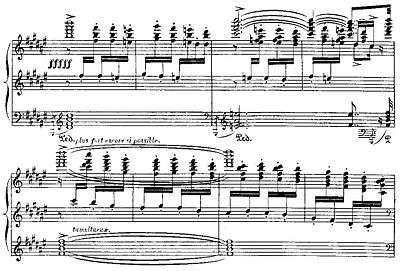Iberia (Albéniz)
Iberia is a suite for piano composed between 1905 and 1909 by the Spanish composer Isaac Albéniz. It is composed of four books of three pieces each; a complete performance lasts about 90 minutes.
It is Albéniz's best-known work and considered his masterpiece. It was highly praised by Claude Debussy and Olivier Messiaen, who said: "Iberia is the wonder for the piano; it is perhaps on the highest place among the more brilliant pieces for the king of instruments". Stylistically, this suite falls squarely in the school of Impressionism, especially in its musical evocations of Spain. Technically, Iberia is one of the most difficult pieces in the repertoire, requiring of its interpreters immense strength and flexible hands.

Composition
Book 1
Dedicated to Ernest Chausson's wife.
- Evocación ("Evocation", A♭ minor and A♭ major), an impressionist reminiscence of Albéniz's native country, combining elements of the southern Spanish fandango and the northern Spanish jota song forms. The rarely seen seven-flat key signature is itself part of the Evocación.
- El puerto (D♭ major), a zapateado inspired by the port town of Cádiz.
- Fête-dieu à Seville (F♯ minor and F♯ major) (alternative titles sometimes found: Corpus Christi; El Corpus en Sevilla), describing the Corpus Christi Day procession in Seville, during which the Corpus Christi is carried through the streets accompanied by marching bands. Musically, this piece consists of a processional march that eventually becomes overwhelmed by a mournful saeta, the melody evoking Andalusian cante jondo and the accompaniment evoking flamenco guitars. The march and saeta alternate ever more loudly until the main march theme is restated as a lively tarantella that ends abruptly with a flamboyant fffff climactic chord; the piece concludes with a gentle coda again evoking flamenco guitars along with distant church bells.
Book 2
- Rondeña (D major), after the Andalusian town of Ronda. A variant of the fandango, it is characterized by the alternation of measures of 6
8 and 3
4. - Almería (G major), relating to the Andalusian seaport of Almería, features the rhythm of the tarantas, a dance characteristic of the region of Almería.
- Triana (F♯ minor), after the Gypsy quarter of Seville.
Book 3
- El Albaicín (B♭ minor and B♭ major)
- El Polo (F minor)
- Lavapiés (D♭ major), after the district of Madrid.
Book 4
- Málaga (B♭ minor and B♭ major)
- Jerez (A minor – arguably E Phrygian – and E major)
- Eritaña (E♭ major)
Vision of Spain presented
The topic of the work is Spain. (He could not call it España, since two pieces had recently appeared with that title.) Yet the vision of Spain it presents is primarily Andalusian. Non-Spaniards may not realize how unusual this is, how this is really "taking a position" with regard to the ongoing debate within Spain over just what Spain is. Cádiz (El puerto), Granada (El Albaicín), Ronda, Málaga, Jerez, Almería, are all Andalusian, and three of the twelve pieces are dedicated to Seville, that most musical of Spanish cities, where more operas have been set than in any other city (es:Anexo:Óperas ambientadas en Sevilla): Holy Week in Seville (Fête-Dieu à Seville), Triana, and Eritaña (a vanished Sevillian inn). Nothing about castles or palaces. The only appearance of Madrid – of Castile, in fact – is the working-class plaza of Lavapiés.
Premiere performance
The twelve pieces were first performed by the French pianist Blanche Selva, but each book was premiered in a different place and on a different date. Three of the performances were in Paris, the other being in a small town in the south of France.
- Book I: May 9, 1906, Salle Pleyel, Paris
- Book II: September 11, 1907, Saint-Jean-de-Luz
- Book III: January 2, 1908, Palace of Princess de Polignac, Paris
- Book IV: February 9, 1909, Société Nationale de Musique, Paris.
Recordings
Among notable early recordings, pieces from Iberia were recorded by Arthur Rubinstein. Iberia was first recorded in its entirety by Alicia de Larrocha in 1958-9 (Hispavox / Erato DUE 20236/37, [EMI 64504?]). She recorded it twice more, in 1972 (London 448191 and 433926), and 1989 (London 417887). It has also been recorded by Claudio Arrau (Books 1 and 2 only), Gustavo Díaz-Jerez, Miguel Baselga, Ricardo Requejo, Michel Block, Guillermo González (according to his own critical edition of the score), Marc-André Hamelin, Yvonne Loriod, Artur Pizarro, Jean-François Heisser and Esteban Sánchez, among others.
Arrangements

Enrique Fernández Arbós and Carlos Surinach each arranged pieces from Iberia for full orchestra. There is an orchestral arrangement of the Fête-dieu à Seville by Leopold Stokowski, from the mid-1920s, which he recorded with the Philadelphia Orchestra in 1928.
More recently, Peter Breiner arranged the whole work for full orchestra. The composer Francisco Guerrero Marín, calling Iberia "the greatest Spanish work in the last hundred years", also made an arrangement of six pieces before his death in 1997. A version for three guitars was made by Christophe Dejour and recorded by Trio Campanella. A two-guitar overdubbing version has been released by French guitarist Jean-Marc Zvellenreuther.
An invitation to Ravel to orchestrate six pieces from Iberia was the genesis of that composer's Boléro.
External links
- Fineman, Yale. "A Synthesis of Styles: the Music of Isaac Albéniz". The Life and Music of Isaac Albéniz. University of Maryland Libraries. Archived from the original on 20 August 2012. Retrieved 5 September 2013.